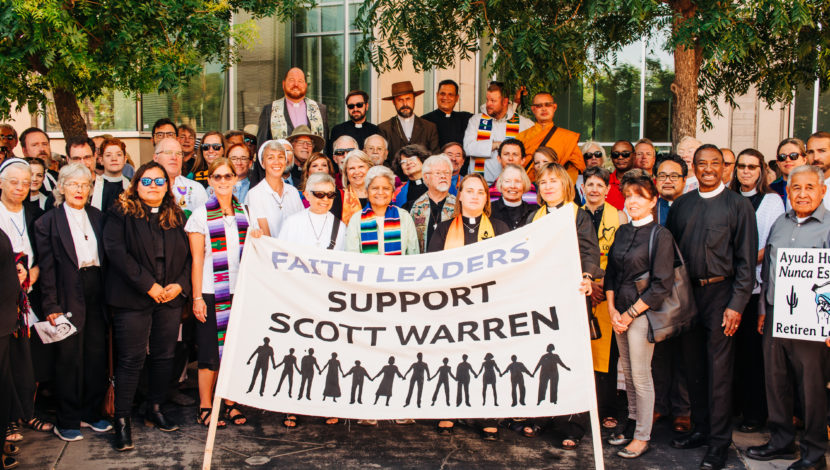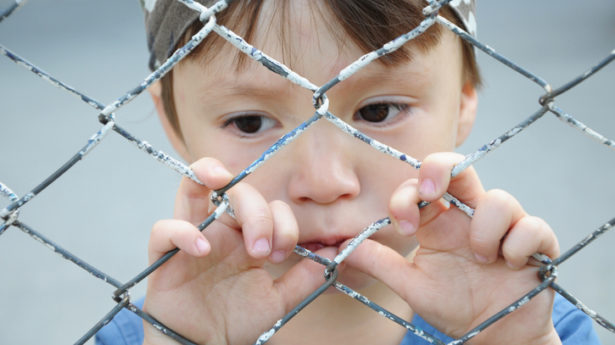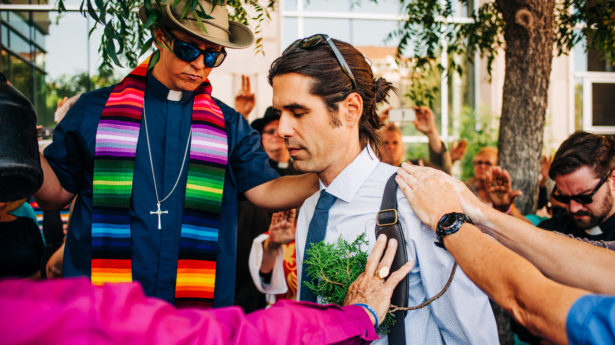The Unitarian Universalist Service Committee advances human rights through grassroots collaborations.
My Experience With Faith Floods the Courtroom for Scott Warren

By Rev. Karen Foster on June 18, 2019
Rev. Karen Foster, a minister at the Unitarian Universalist Fellowship of Northern Nevada in Reno, served as a UUSC clergy representative to bear witness to the trial of Dr. Scott Warren, a volunteer with UUSC partner No More Deaths. Dr. Warren faces up to 20 years in prison for providing humanitarian aid to two Central American migrants crossing the border in January 2018.
Silence fell over the courtroom at the question. How could Scott possibly give water, food, and shelter to those crossing into our country illegally? His defense attorney was somewhat apologetic about this line of inquiry. During Scott’s testimony, you could have heard a pin drop. He is soft-spoken, humble, unassuming, and very intelligent. Scott would be a fascinating speaker at any event. He gives the impression of measuring carefully every word he speaks. And not because he wants to control the outcome in court, but because he is a man if immense integrity and words are important to him. Because they matter.
The few seconds of silence seemed like an eternity. Then Scott’s reply.
“How could you not?”
To put on trial this man of gentleness and compassion for giving water, food, and shelter to folks in need in the desert is one of the most ridiculous uses of our court system that I have seen in a long time. The abuses that the current administration is perpetrating to drive an aggressive and harassing border patrol are abhorrent. There was a time when border patrol and agencies like No More Deaths sometimes collaborated to prevent deaths and take care of those needing care at the border. But this is no longer the case.
I had the opportunity to meet Scott briefly outside the courtroom, and later, his parents. Scott is a native son of Reno, Nevada, where I serve our UU congregation. He graduated from the University of Nevada-Reno. He expressed his gratitude for all of the support, particularly to me and others who traveled to be there. His ability to be completely present in that conversation given what he is going through speaks volumes about who he is at his core.
The verdict of a hung jury (one source reported that their vote was eight to acquit, four to convict) was not entirely surprising. On the one hand it is something to celebrate that the U.S. government was unable to prove their trumped-up case. On the other hand, it would be a much stronger validation of our core American values if the court had completely exonerated Scott – validating the right to offer assistance to our fellow human beings.
In his statement after the court hearing was over, Scott noted that since his arrest in January of 2018, more than 80 sets of human remains have been found in the desert. This reality motivates volunteers who, despite the risks of facing charges like Scott’s, are continuing to provide necessary humanitarian aid in the desert to prevent deaths. He expressed concern about the two migrant men who were arrested along with him and acknowledged that they do not have the same base of support that he does.
I was also moved by the way Scott and the other witnesses from No More Deaths talked about their work, their commitment to it, and the care, thought, and rigorous conscientiousness with which they go about it. Scott and the others talked of searching for and finding human remains in the desert, sometimes bones, sometimes remains in varying states of decomposition. He spoke reverently of ritually “holding space” when remains are found. This, he said, is out of respect and sorrow for the person who passed and their families. He said he found this to be particularly profound when it appeared the person died alone, which often seems to be the case.
Finally, I was impressed by the testimony of one of the No More Deaths volunteers who is an emergency medical technician when she described using the policies and procedures of the American Red Cross as a basis to write the policies for No More Deaths. These protocols set forth the direction for providing food, water, medical care, shelter, and how to assess the condition of migrants, which amounts to providing humanitarian aid, compassion, and kindness which results in saved lives.
As people of faith who believe in the inherent worth and dignity of every person, we must continue our fight to insist that providing humanitarian aid is not a crime. Compassion and kindness are the bedrock of a civilized society.
Indeed, how can we not?
Photo Credit – Ash Ponders on behalf of UUSC
***
About UUSC: Guided by the belief that all people have inherent worth and dignity, UUSC advances human rights globally by partnering with affected communities who are confronting injustice, mobilizing to challenge oppressive systems, and inspiring and sustaining spiritually grounded activism for justice. We invite you to join us in this journey toward realizing a better future!

